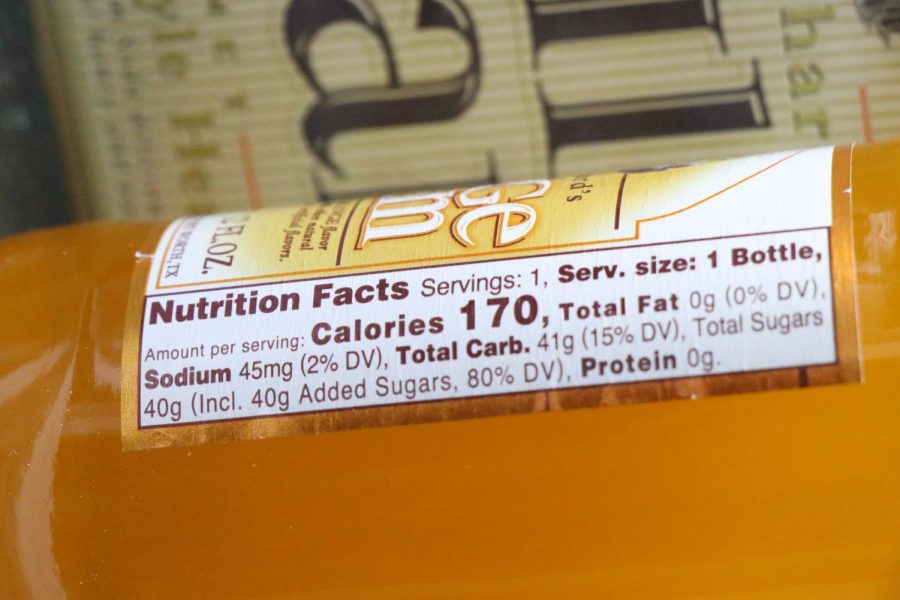Effects of Sugary Beverages
THE COST OF SUGARY BEVERAGES Over 1,000 people per month experience false advertising from soda labels, making them unaware of the dangers in the liquids they consume. The public is put at very large health risks, without even knowing it.
October 31, 2019
Recently, scientists have discovered a rise in diabetes, gum disease and heart disease rates across the country. They have traced these cases back to a base problem: the over-consumption of sugary drinks. However, this may not be consumers’ fault completely. The government is allowing companies to offer their products to stores to sell in extreme serving sizes. Not only that, but the bottles do not include enough label information for the public to be fully aware of what they are consuming. State legislation in some areas has implemented taxes, banned large amounts of sugary drinks ability to be sold, and forced companies to add warning labels to their products, allowing the public to become more informed on what they are consuming. This way, it will be up to the public to protect their own health. As a result, the government is attempting to limit the legal size of sugary drinks that can be sold to protect the citizens.
Drinks that are considered “sugary” are drinks with additive sugar or other sweeteners (high fructose corn syrup, sucrose, and fruit juice concentrates). This includes any drink with the ending “ade,” soda, tonic, energy drinks, sports beverages such as Gatorade, and any other powder-sweetened drinks. Consumers of these drinks have had twice the likelihood of getting diabetes and life- threatening heart diseases than people who solely consume water and non-sugary beverages. Recent cases in deaths due to heart failure and diabetes, as well as health issues such as tooth decay and cavities, all relate back to the consumption of sugary drinks. According to the New York Times, researchers conducted an experiment including more than 118,000 men and women. The data the researchers attempted to collect was the amount and rate of consumption of sugar sweetened beverages. After 30 years had passed, researchers found 36,436 people had died of the original 118,000 people that were tested. The
researchers concluded that each additional 12-ounce serving of sugary drinks was associated with a seven percent increased risk for death from any cause, a five percent increased rate of death by cancer, and a ten percent increased risk for death from cardiovascular disease. Some scientists believe that the government should limit serving sizes of sugary drinks to 16-ounce cans and lower due to these common, recent issues of sugar related deaths.
Several states have announced taxes and label protocols in protection of their state citizens’ health. In California, the legislation called for warning labels to be put on to the sides of sugary drink bottles. This forces the companies to show that there is danger in consuming these drinks. This will allow readers a further insight as to what they are putting into their bodies, and how their choice in consuming that drink could have a massive effect on their personal health. Furthermore, states such as Illinois and New York have both made efforts to ban large sodas in their states and both cases are now before the state’s highest court. Meanwhile Mexico was found to be the number one leading country in the world with deaths from sugary drinks, so they enforced demanding taxes on people who purchase sugary beverages. People who are against the tax believe that this could become an economic burden on less fortunate people who find sugary beverages such as soda to become their primary beverage consumed. However, The American Heart Association argues that the taxes will be beneficial, because based on scientific evidence, adults who drink sugary drinks have a 27 percent higher chance of becoming obese. Kids with this same habit face more than double the risk, with a 55 percent increased chance of becoming obese, and are more susceptible to tooth and gum issues.
Other debates have yet to be settled on whether this is a large enough issue to truly become a nationwide issue. In other words, does this really effect as many people as it seems. Freshman Ryan Yelig said, “I consume sugary drinks on occasion, because I am aware of possible health effects that could later come in my life if I drink sugary drinks constantly.” This being the same with a lot of teenagers who seem to simply enjoy the taste of sugary beverages but tend to be familiar with possible
health effects coming from additive sugar. Yet, the government is not fully aware of how many people it is truly affecting. Junior Evan Roorda said, “The government should be forced to make laws such as adding additional information on labels to help give the consumers a better idea of what they are consuming and putting into their body.” Touching on ways the companies can control this issue, scientists have also recommended for people to be cautious when purchasing large amounts of sugary drinks because a big part of this issue is human error and freedoms as well.
In addition, sophomore Michael Moore said, “I think eventually the government will take this into consideration, but as of now, they don’t realize the severity this issue is having on the public.” Sharing a similar point of view, senior Molly Burles said, “The government won’t realize the severity of the issue until there are numbers that a show large amounts of deaths come from sugary drinks.” Overall, there are strong beliefs that there needs to be a big detrimental occurrence to happen for the government to truly consider how these products are negatively affecting people worldwide.
The consumption rate of sugary drinks has become extremely high across the world, and many people are suffering to great extents because of this.




